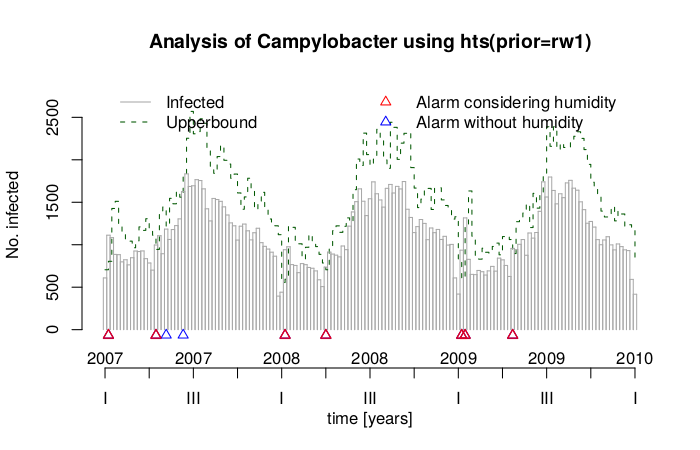Project Example: Outbreak detection of Campylobacteriosis time series

Research Objective
In order to detect dispersed or nationwide infectious disease outbreaks, public health institutions are monitoring reported infectious disease reports. In this context, fast and efficient statistical methods are essential as components of the data-mining process in detecting aberrations in routinely collected surveillance data. Those data exhibit time trends, strong seasonality and various artefacts. This project was concerned with the development of an automated algorithm that analyses time series data of infectious disease reports. Based on all past observations, the seamless procedure is computes a threshold to decide whether the observation of the current disease counts is unusaul. The developments were motivated by the routine monitoring of Campylobacteriosis in Germany, the leading cause of enteritic illness in industrial countries. Since foodborne disease spreading is strongly influenced by weather conditions, the weekly mean absolute humidity is considered as potential covariate to correct for epidemiological background information.
Statistical Methodology
- Bayesian generalized additive model for negative Binomial distributed disease counts
- Time series decomposition into autoregressive terms, time trend, seasonal periodicity and covariate effects
- Seamless threshold computation as quantile of the predictive posterior distribution
Software
Open source implementation using integrated nested Laplace approximation (INLA) surveillance::boda() is available on R-forge.
Related Publications
- J. Manitz, and M. Höhle (2013): Bayesian model algorithm for monitoring reported cases of campylobacteriosis in Germany. Biometrical Journal, 55(4), pp. 509–526.
- Höhle, S. Meyer, M. Paul, M. Salmon, contributions by T. Correa, L. Held, M. Hofmann, D. Sabanés Bové, S. Steiner, M. Virtanen, J. Manitz (2014): surveillance: An R-package implementing statistical surveillance algorithms and spatio-temporal modelling.
- J. Manitz (2010): Automated Detection of Infectious Disease Outbreaks. Diploma thesis, Department of Statistics, Ludwig-Maximilians-Universität München.
Remark
- Early career award at Conference on Inference For Epidemic-related Risk (InFER, March 2011).
- One of three finalists for the award for Outstanding Research Article in Biosurveillance 2014 by the International Society for Disease Surveillance.
